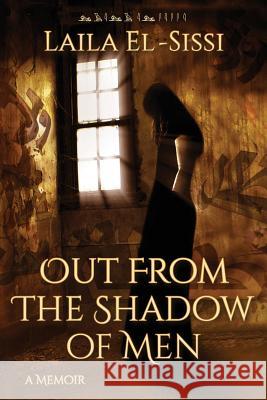Out From The Shadow Of Men » książka
Out From The Shadow Of Men
ISBN-13: 9780990335412 / Angielski / Miękka / 2015 / 312 str.
Out From The Shadow Of Men
ISBN-13: 9780990335412 / Angielski / Miękka / 2015 / 312 str.
(netto: 79,59 VAT: 5%)
Najniższa cena z 30 dni: 79,56
ok. 16-18 dni roboczych.
Darmowa dostawa!
"The shadow of a man is better than a roof over the head." This Arabic proverb has long described the plight of women in Egypt. Like the classic Pyramids of Giza, the culture of Egypt for the most part stands unchanged. Egyptian men continue to use the banner of Islam and antiquated interpretation of the Quran to justify controlling women. Egyptian women continue to believe God has ordered men to do so. Yet Laila El-Sissi broke the pattern. Forty years ago, when Laila, a shy and malleable 15-year-old, and her more rebellious 16-year-old sister Rawyia learn that they are betrothed to men they have never met, they refuse to live in the prison constructed by their society, hoping for a better life than that of their mothers and aunts. Running from their tyrannical father, an abusive brother, and arranged marriages to men twice their age, Laila and Rawyia risk their reputation and safety, and plot their escape. Out from the Shadow of Men tells the story of two sisters as they find the courage and joie de vivre to risk their lives and stand up to forces seemingly as large, strong and ancient as the pyramids so they can choose their futures. At its heart it is the account of two brave, intelligent girls not content to have their lives ruled by others-not even their father. It is a testament to the power of a sister, someone to stand by your side and help you realize your dreams. Rich in details of the everyday lives of middle and upper class families in Egypt, this memoir reveals what life was like-and still is like today-for Egyptian girls and women. It exposes their subjugation, lack of autonomy, and battles with the antiquated marriage laws from which they have no recourse. Written in the pitch perfect voice of 15-year-old Laila as she struggles to understand the unfair world she was born into, her story is more poignant and relevant now than ever as the "Arab Spring" and the atrocity of ISIL crimes committed against women, continues to spread across the Middle East and a growing number of women in this region fight for freedom. Despite recent laws giving women greater (though still unequal) rights, the Egypt of today is not very different from that of the 1960s. Arranged (or forced) child marriages remain common not only in the Middle East but also in Southeast Asia and Africa and among families from those regions who have emigrated to the West. Worldwide, millions of such marriages occur every year. The current revolution in Arab world has brought Islamists into power and introduced new threats to the few improvements made a decade ago. Women's rights and freedoms are still under serious attack in Egypt, Tunisia, Libya and Syria and changes will come very slowly, if ever.
"The shadow of a man is better than a roof over the head." This Arabic proverb has long described the plight of women in Egypt. Like the classic Pyramids of Giza, the culture of Egypt for the most part stands unchanged. Egyptian men continue to use the banner of Islam and antiquated interpretation of the Quran to justify controlling women. Egyptian women continue to believe God has ordered men to do so.Yet Laila El-Sissi broke the pattern. Forty years ago, when Laila, a shy and malleable 15-year-old, and her more rebellious 16-year-old sister Rawyia learn that they are betrothed to men they have never met, they refuse to live in the prison constructed by their society, hoping for a better life than that of their mothers and aunts. Running from their tyrannical father, an abusive brother, and arranged marriages to men twice their age, Laila and Rawyia risk their reputation and safety, and plot their escape.Out from the Shadow of Men tells the story of two sisters as they find the courage and joie de vivre to risk their lives and stand up to forces seemingly as large, strong and ancient as the pyramids so they can choose their futures. At its heart it is the account of two brave, intelligent girls not content to have their lives ruled by others-not even their father. It is a testament to the power of a sister, someone to stand by your side and help you realize your dreams. Rich in details of the everyday lives of middle and upper class families in Egypt, this memoir reveals what life was like-and still is like today-for Egyptian girls and women. It exposes their subjugation, lack of autonomy, and battles with the antiquated marriage laws from which they have no recourse. Written in the pitch perfect voice of 15-year-old Laila as she struggles to understand the unfair world she was born into, her story is more poignant and relevant now than ever as the "Arab Spring" and the atrocity of ISIL crimes committed against women, continues to spread across the Middle East and a growing number of women in this region fight for freedom. Despite recent laws giving women greater (though still unequal) rights, the Egypt of today is not very different from that of the 1960s. Arranged (or forced) child marriages remain common not only in the Middle East but also in Southeast Asia and Africa and among families from those regions who have emigrated to the West. Worldwide, millions of such marriages occur every year. The current revolution in Arab world has brought Islamists into power and introduced new threats to the few improvements made a decade ago. Womens rights and freedoms are still under serious attack in Egypt, Tunisia, Libya and Syria and changes will come very slowly, if ever.











